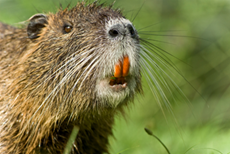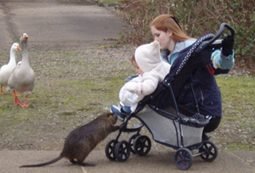 There’s this rodent who is overtaking the wetlands. It’s just not dwelling in the wetlands but by its burrowing habits is causing a huge menace!
There’s this rodent who is overtaking the wetlands. It’s just not dwelling in the wetlands but by its burrowing habits is causing a huge menace!
Scroll down to know more about it!
Nutria is the semi-aquatic rodent which is invading the wetland and is causing a nuisance. Nutria spends half of its life in the water. Nutria is an excellent swimmer that can spend 5 minutes under water without returning to the surface to breathe.
They are found in huge numbers in the wetlands which are a critical part of our natural environment. Wetlands protect shores from wave action and reduce the impacts of floods. Wetlands help keep river levels normal. They accept water during storms and whenever water levels are high. When water levels are low, wetlands slowly release water.
The wetlands absorb pollutants; thus, they filter and purify the surface water improving the water quality. They provide habitat for plants and may contain a wide diversity of life, supporting plants that are found nowhere else.
But these wetlands are threatened by invasive rodents such as nutria. This two-foot-long rodent can grow as large as 20 pounds. It can eat 25% of its own weight every day.
These raccoon-sized rodents from South America have invaded every continent except Antarctica and Australia, and have set up camp in at least 18 US states and are spreading all over rapidly.
 Nutria has long incisors that are yellow to orange or orange to red in color.
Nutria has long incisors that are yellow to orange or orange to red in color.
Nutria can survive between 8 and 10 years in the wild. Nutria are known for devastating marshy ecosystems. Nutria use their incisors and powerful forefeet to dig under the marsh surface to feed directly on the root mat, leaving the marsh pitted with holes and deep swim canals. They mow down the local vegetation, destroy flood control by burrowing through levees, and edge out native animals that don’t reproduce as quickly. Their burrowing habits weaken infrastructure, which is problematic for flood control systems. Nutria has a huge appetite. The headlines from few of the news is so horrifying that it clearly shows how troublesome these pests must be.
The Sacramento Bee says “Invasive swamp rodent known as nutria has California scrambling to come up with a battle plan”
Ryan Sabalow, The Sacramento Bee Published 2:05 p.m. PT Feb. 24, 2018
About the size of a beagle, they can quickly turn a lush green marsh to a wasteland. They use their long orange teeth to gnaw through vegetation and reach the succulent bits they crave.
Females can have litters of a dozen or more and become pregnant within 48 hours after giving birth, their fertility adding to the speed with which this South American rodent can fan across a landscape, burrowing into levees and destroying wetlands along the way.
They are called nutria, and right now they’re starting to spread through the waterways leading into the Sacramento-San Joaquin Delta, the ecologically fragile network of sloughs and rivers that functions as the heart of California’s flood-control and water distribution system.
In other states, taxpayers have spent tens of millions of dollars fighting nutria infestations.
Second-ever nutria reported in Kentucky caught in McCracken
By STEVE VANTREESE Dec 23, 2017 – The Paducah Sun
The nutria is an invasive rodent larger than a muskrat and smaller than a beaver that could be confused with either native animal. Its round, largely hairless “rat” tail is a giveaway.
The nutria is an invasive semi-aquatic rodent in America, an unwanted nuisance species that hails from South America. It has been found in at least 22 states, but it is recognized as having a foothold with a reproducing population in much less territory, mostly Gulf coastal areas of the Southeast.
The nutria is also known to enter the areas of human dwellings. The menace caused by Nutria has proved destructive to humans and as well to the eco-system. Conventional methods like rodent traps, fumigation, glue boards, rodent baits etc. have proved ineffective.
When the conventional methods have proved ineffective why not use methods which are effective and are of eco-friendly nature.
Combirepel™ a C Tech Corporation product is an anti-rodent aversive which repels rodents and thus prevents the nuisance caused by them. This product acts through a series of highly developed intricate mechanisms ensuring that rodents are kept away from the target application.
This innovative product is available in masterbatch form, which can be incorporated within the tubes, pipes, agricultural films, wires, and cables etc. The product does not leach out from the polymer matrix, thus preventing soil pollution.
The product in form of liquid concentrate can be mixed with paints and be applied on the interior and exterior of the houses, already installed wires and cables, pipes, house fencing etc. to keep nutria away from human areas.
Our product in lacquer can be coated over wooden fences around wetlands, tree guards, and on a variety of surfaces like metals, concrete, polymer, ceramic etc. which would ensure complete protection against these creatures.
Our product provides a safe and environmentally friendly solution to avoid rodent infestation!
If you are facing nuisance caused by rodents or insects, write about it to us at technical.marketing@ctechcorporation.com
Also, visit our websites:
http://www.ctechcorporation.com/
http://www.rodrepel.com/
http://www.termirepel.com/
http://www.combirepel.com/
Follow our Facebook pages at:
1] https://www.facebook.com/Combirepel-411710912249274/
2] https://www.facebook.com/Termirepel-104225413091251/
3] https://www.facebook.com/Rodrepel-120734974768048/
Follow us on our Twitter pages at:
1] https://twitter.com/rodrepel
2] https://twitter.com/termirepel
3] https://twitter.com/combirepel
